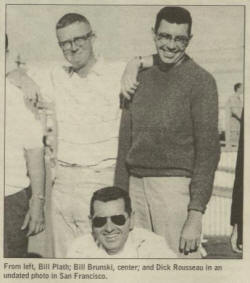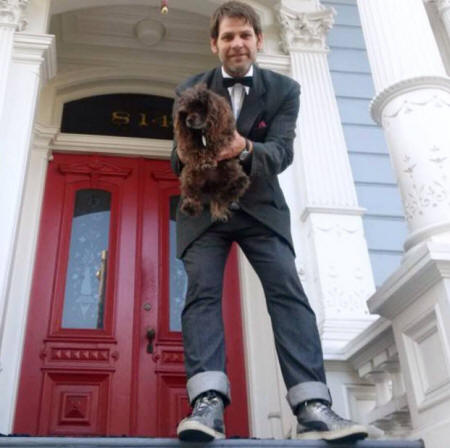

Partner Dick Rousseau
Queer Places:
814 Grove St, San Francisco, CA 94117
D'Oak Room, 350 Divisadero St, San Francisco, CA 94117
Opera Club, 621 Gough St, San Francisco, CA 94102
Orpheum Circus, 1192 Market St, San Francisco, CA 94102
 William "Bill" Plath (January 27, 1925 - July 9, 2002) was a San Francisco
businessman and gay activist. He cofounded the Society for Individual Rights,
one of the first gay rights organizations, in 1964. A longtime manager at several of the city's first gay bars, Plath and his partner of 45 years, Dick Rousseau, hosted a variety of civic events, parties and political figures at their Alamo Square home.
Bill Plath, Dick Rousseau, and Billy Brunski bought the Victorian at 814 Grove
Street in 1957, for $13,000 in 1957. Because the three gay men were white, the 800 block of Grove
was spared from being included in the city's redevelopment plans for the area, said
Michael Nelson Finn, a gay man and performance artist who in the early 2000s inherited the home from the men. He had befriended Plath and later became his caretaker.
William "Bill" Plath (January 27, 1925 - July 9, 2002) was a San Francisco
businessman and gay activist. He cofounded the Society for Individual Rights,
one of the first gay rights organizations, in 1964. A longtime manager at several of the city's first gay bars, Plath and his partner of 45 years, Dick Rousseau, hosted a variety of civic events, parties and political figures at their Alamo Square home.
Bill Plath, Dick Rousseau, and Billy Brunski bought the Victorian at 814 Grove
Street in 1957, for $13,000 in 1957. Because the three gay men were white, the 800 block of Grove
was spared from being included in the city's redevelopment plans for the area, said
Michael Nelson Finn, a gay man and performance artist who in the early 2000s inherited the home from the men. He had befriended Plath and later became his caretaker.
William John Plath was born in Spencer, Wisconsin. He grew up in Chicago and served in the U.S. Army during World War II. He moved to San Francisco in the early 1950s after hearing that the city had a growing gay community.
Plath managed several gay bars where he served as a community liaison and matchmaker and joined several other bar owners to form the Tavern Guild in 1962, believed to be the nation's first gay business organization. Two years later, Plath helped found the Society for Individual Rights, a gay rights group that drafted a "homosexual bill of rights" and advocated for causes through legal channels and with civil disobedience. The group is credited with teaching many public officials about the needs of the gay and lesbian community, including then-Assemblyman Willie Brown. Brown's request for an endorsement from the group marked the first time a politician had sought out gay or lesbian votes.

Michael Nelson Finn
After a stint in the classified advertising department of the San Francisco Examiner, Plath began a career in the bar and restaurant business managing Bond Street, a gay bar in North Beach, the first of many he would operate over his lifetime, including the Opera Club and the Orpheum Circus. Bond Street was followed by the D'Oak Room, which he opened at the corner of Divisadero and Oak. Characteristic of Plath's humor, friends said the name was chosen as a play on the Oak Room, a swank men's bar at the St Francis Hotel. The D'Oak Room was my heaven, Plath said. Licensed to sell only beer and wine, the bar featured Plath's beloved German music on the jukebox, draft beer for a nickel, and one of a kind festivities like Swiss Independence Day, Catherine the Great's Birthday and the Wedding Anniversary of Ferdinand and Isabella. Plath described the bar as: a place where everybody knew each other. That was one of the things I pushed very strongly. A total stranger would come in, we'd get into a conversation, and I'd introduce him to everybody. I'd find jobs for people, apartments for people, roommates, all sorts of things. It was a pleasure doing that.
The Opera Club was located on Gough Street between Grove and McAllister. It was a full liquor bar and restaurant. Plath also brought back Jose Sarria and his operas for Sunday brunch. Ross cooked the food and Sarria served brunch. Afterwards, Sarria would perform one of his famous Black Cat operas to a packed house. After the Black Cat Café, an historic queer bar on Montgomery Street in San Francisco, closed in 1964, the original papier mache mascot, a roughly 6 foot long cat that sat above the bar of the, was inherited by Bill Plath and Dick Rousseau. After their death, the cat was then inherited by Plath’s adopted son, Michael Finn.
The Orpheum Circus was a bar located in the building on Market Street that today houses the Orpheum Theatre. It became a haven for auctions, shows, and many other community fundraising efforts, and was a successful bar.
Plath and his partner hosted political fund-raisers at their home for a variety of politicoes, including former San Francisco Mayors George Moscone and Dianne Feinstein and former Assemblyman Milton Marks. The couple's house was also legendary as the site of an annual Christmas party.
After retiring from the bar business, Plath's love of the performing arts led him to a job as a costumer for performers, mainly at the 42nd Street Moon, a theater group that performs "lost" musicals.
Plath was survived by a son, Mike Finn, and his partner, Russell Zellers.
My published books: